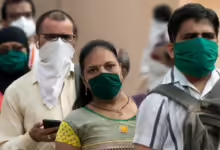-
NATIONAL

The Vijayawada railway station was inspected
On Tuesday, the Vijayawada train station’s food shops were the subject of an unexpected inspection…
Read More » -

-

-

-

-
UP STATE

Says SP Chief Akhilesh Yadav, “Clean Sweep of INDIA Bloc…
According to Samajwadi Party head Akhilesh Yadav, “winds of change” are blowing from western Uttar…
Read More » -

-

-

-
BIHAR

This Bihar girl, who topped IIT, placed 66th in BPSC,…
On Tuesday, the much expected Union Public Service Commission (UPSC) 2023 test results were made…
Read More » -

-

-

-
ENTERTAINMENT

Samantha Ruth Prabhu’s Incredibly Funny Reaction To Varun Dhawan’s Newest…
Citadel is a television series that Varun Dhawan and Samantha Ruth Prabhu are slated to…
Read More » -
ENTERTAINMENT

Pyaar, a Malayalam film by Manoj Govindan, would depict a…
Dr. Manoj Govindan is the writer and director of the Malayalam and English films Pyaar.…
Read More » -
ENTERTAINMENT

Manisha Rani has revealed her new video, “Bairan Begani,” and…
With her next song video, “Bairan Begani,” Manisha Rani is getting ready to wow viewers…
Read More »
-
INTERNATIONAL

A day after their unusual meeting, the chiefs of defense…
One day after the US and Chinese defense chiefs conducted their first discussions since November…
Read More » -

-

-

-

-
HEALTH

Ram Navami Fasting Guidelines: What to Do and What Not…
Ram Navami is a global Hindu holiday that is widely observed to honor the birth…
Read More » -

-

-

-
LIFESTYLE

Ranchi Man Makes His Family Proud by Securing 151st Place…
The Union Public Service Commission (UPSC) test is one of the most difficult in India.…
Read More » -

-

-

-
SPORTS

Watch the cutest face-off between Rahul Tewatia and Ponting Jr.…
Rahul Tewatia of the Gujarat Titans tested his batting prowess against Ricky Ponting’s kid before…
Read More » -
SPORTS

Michael Slater, a former Australian celebrity, breaks down after being…
Michael Slater, a former Test cricket player, allegedly broke down in front of an Australian…
Read More » -
SPORTS

IPL 2024: Jos Buttler comments, “It was important to never…
Jos Buttler, a standout for the Rajasthan Royals, said on Tuesday that he never lost…
Read More » -
SPORTS

“We view every game as a semifinal right now,” RCB…
Following his team’s sixth loss in seven games in the current Indian Premier League, head…
Read More » -
SPORTS

KKR defeats the Royals 223 for 6 thanks to Narine’s…
At a crowded Eden Gardens on Tuesday, Sunil Narine scorched to his maiden IPL century…
Read More »


























